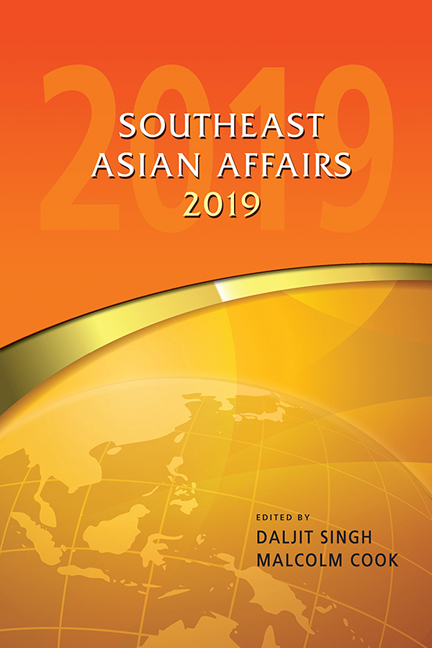Book contents
Competing Logics: Between Thai Sovereignty and the China Model in 2018
from THAILAND
Published online by Cambridge University Press: 07 September 2019
Summary
In September 2018 a quarrel between a Thai border guard and a tourist from the People's Republic of China at Bangkok's Don Mueang Airport turned violent. The argument took place after the Chinese visitor was denied entry on the grounds that he could not produce evidence that he would return to China after his trip to Thailand. The incident should be worrying for Thailand, given the country's increasing reliance on the growing numbers of Chinese tourists since the coup of 2014. Yet this incident is also symbolic of the internal pressure generated within the Thai state as a result of having to manage China's encroachments on Thai sovereignty.
In 2018 the Thai military government struggled to maintain a balance between two opposing policy logics. On the one hand, China has become not just a critical economic partner but also a potential model of governance; on the other, Thailand's resilient strategic culture and national identity each emphasize sovereignty and independence, requiring judicious diplomacy with the great powers as the primary tool to achieve these ends. Clearly, there is a tension here: while Thailand may find the stability of authoritarian capitalism attractive, it no more wants coercion from China than it does from the United States.
In this chapter I assess the extent to which 2018 may have seen the highwater mark of Thailand's embrace of China and its adoption of the China model. I argue that while permanent traces of this connection will remain in the form of more repressive domestic security policies and the goal of greater mainland Southeast Asian economic connectivity, warming relations with the United States will balance Thailand's strong tilt to China over the past five years. The article proceeds in five parts. I begin by examining Thailand's domestic political situation, highlighting how, since 2014, the junta's need for legitimacy has increasingly relied on the Thai elites who fear the rise of a mass movement capable of urban disruption. In the second section, I contend that Thailand is seeing the development of a protection pact between elites, such that they are prepared to sacrifice political liberties for increased security.
- Type
- Chapter
- Information
- Southeast Asian Affairs 2019 , pp. 341 - 358Publisher: ISEAS–Yusof Ishak InstitutePrint publication year: 2019



